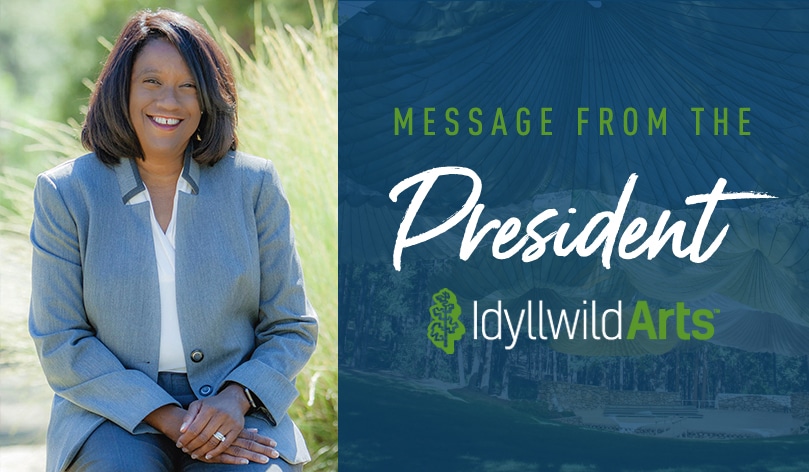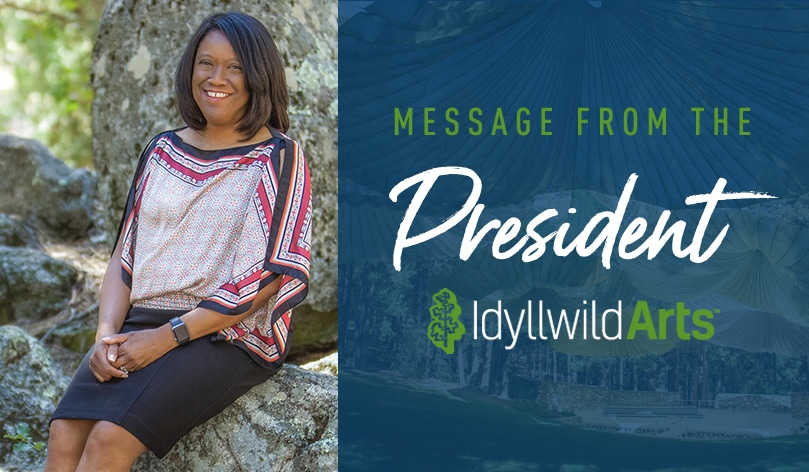Dear Idyllwild Arts Community, It is with deep sadness that I share with you that…

Message from the President
Dear IAF Community,
Schools around the world have settled into the academic year. Whether through in-person instruction, distance learning, or a hybrid model, everyone is trying to help students gain a sense of normalcy. While this can seem impossible in virtual spaces, it is nonetheless our teaching and learning environment until the pandemic has ended.
Earlier this month, I spoke at a leadership workshop for a school in Singapore. They chose the theme of Leadership and Innovation, as they seek ways to transform their education when the health crisis is over. As much as I wanted to address the innovation that schools sought before the crisis, it is impossible to ignore the changes that will surely result from the pandemic. During my address, I shared five lessons I have learned during the crisis. They are listed below in no particular order.
Lesson #1: Identify the goal to measure success.
When Idyllwild Arts moved to online instruction in April, we, like many schools, worked to transfer all in-person classes to an online platform. We quickly realized that students were under tremendous pressure. Their lives were upended and, for many of them, the future was uncertain. Our faculty and school leadership saw that our goal had to be to do no harm to the students we serve. Whether it was rethinking assignments, reconsidering how we grade assignments, or determining how students would complete their final art projects, we had to accept the fact that students were working under extreme pressure and their mental health had to be among our highest priorities.
Lesson #2: Remain mission driven.
Idyllwild Arts has been a thriving institution for nearly seventy-five years by keeping our purpose and mission central to who we are and in what we believe. Our school was born out of the devastation of the Second World War and we knew then, as we know now, that artmaking possesses the transformative power to change lives and that those lives make a positive difference throughout the world. When we were forced to dismiss school suddenly, we watched our students scatter across the globe and realized that they were returning to five continents, thirty-five countries, and two hundred cities to make a difference in the world.
Lesson #3: Sit in the seat of empathy.
The challenges we are experiencing this year are incomparable. When we pass strangers on the street, there is a sense of knowing that we share and recognize even behind our masks. Understanding what others are going through is essential in this environment. Some teachers are teaching while their own children attend school in the background. Some parents are working from home while watching their five-year-old start kindergarten online. Students with learning differences are trying to stay positive and get the resources they need to understand a lesson or complete an assignment. And too many families have lost employment and are wondering how long this pandemic can possibly last. Everyone is touched by this pandemic and in our most difficult times we must embrace the adage to “walk a mile in someone else’s shoes.”
Lesson #4: Communication
Communication made my list not because we do it well, but because no matter how much we try to communicate, we can, and must, do more. During times of such uncertainty we not only need to share our thoughts, plans, and decisions, but we also need to hear from others in order to address their questions and concerns. LSU Communication Studies Professor Stephanie Houston Grey has written about how studies linking trauma and communication show that as people seek to understand or make sense of their circumstances during and after trauma, they “search for a legitimate vocabulary through which to make sense of their experiences.” No matter how much we say or how often we say it, we can and must communicate with one another.
Lesson #5: We can do that which is hard.
As the world moved into the twenty-first century, many schools acknowledged that they have made incremental change when innovative change was the goal. Incorporating technology into the classroom, flipping the classroom to make the most of in-person instruction, and creating flexibility to move easily from one method of instruction to another made the educational space more efficient but perhaps no less overwhelming. For many students, school days, homework assignments, and extra-curricular activities stretch the school day from morning until night and leave many educators questioning what is essential.
Moving online and returning students to their homes around the world was no small feat. Preparing the campus for students to return required resources we would have once told ourselves were impossible to provide. Keeping hundreds of boarding students and other campus residents safe during a pandemic would have been unimaginable before the crisis. But in this landscape we have stretched ourselves to imagine and implement what had seemed impossible.
I am grateful to our extraordinary faculty and staff who are doing everything possible to keep our students safe, healthy, and engaged. They are meeting students across multiple time zones, sterilizing classrooms, studios, and rehearsal spaces throughout the day, and meeting one-on-one with students to guide their college portfolios and artist statements.
We are grateful to the students who travel from near and far to attend Idyllwild Arts. We are an international school with a rich and diverse culture because of our students from the United States and around the world. Everyone deserves this education and we are committed to serving our students wherever they are making a difference in the world.
Best regards,

Pamela Jordan
President


This Post Has 0 Comments